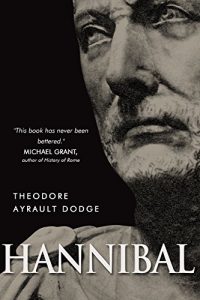Carthage grew to rival Rome.
But only under the leader of its greatest general: Hannibal.
A clash of titans was inevitable.
Roman jealousy brought about the First Punic War — in which Hamilcar became a leading commander — and her efforts enabled her to defeat Carthage in her own element: at sea.
Although Carthage was on the wane at the time of the Barcas, the impetus, intelligence and ability of Hamilcar and then his son Hannibal almost carried them to success.
As a commander Hannibal was a visionary, recognising challenges that he would have to face before being able to set foot on Italian soil in 218 B.C., as well as opponent’s weaknesses.
By virtue of having followed in his footsteps with the sources, Dodge’s narrative is very much grounded in the topography and delivers a greater understanding to the general’s wars.
With admirable calculation of the power of the forces opposing him, Hannibal disregarded the accepted rules of war and took advantage of circumstance … or made his own.
Much like Alexander, Hannibal would act promptly and energetically on this knowledge but following Cannæ he was obliged to confine himself within much narrower boundaries.
A master tactician, it was in logistics and overall strategy that Hannibal excelled and led to him defying numerous efforts to dislodge him from his Italian foothold.
In the end it was the Carthaginian senate, facing defeat at Scipio’s hands, who would relieve the pressure on Rome by ordering Hannibal to return home in attempt to save a lost cause.
Inevitably the Romans proved themselves fast learners once more, and for all the bitter experiences he had inflicted upon them it was Hannibal who taught them the art of war.
In this masterful two-volume study of the Romano-Carthaginian art of war, Theodore Ayrault Dodge charts Hannibal’s extraordinary career and examines how he earned the moniker “the Father of Strategy.”
“This book has never been bettered.” Michael Grant, author of History of Rome
Theodore Ayrault Dodge (1842-1909) was an American soldier and military historian. Enlisting in the U.S. Army in 1861, he saw action at Gettysburg and eventually rose to the rank of brevet lieutenant colonel. Spending his later life devoted to writing, he became known for his works on the Civil War and the great captains of Ancient and European history.
Albion Press is an imprint of Endeavour Press, the UK's leading independent digital publisher.






